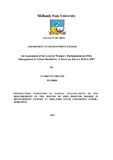Please use this identifier to cite or link to this item:
https://cris.library.msu.ac.zw//handle/11408/3930| Title: | An Assessment of the Level of Women’s Participation in SMEs Management in Urban Zimbabwe: A Focus on Harare, 2012 to 2017 | Authors: | Chigudu, Clarette | Keywords: | women’s Participation SMEs Management |
Issue Date: | 2017 | Publisher: | Midlands State University | Abstract: | The purpose of the study was to assess the level of women’s participation in SMEs management in Harare, Zimbabwe. The study used mixed research design in which both qualitative and quantitative approaches were employed. The study area was conveniently based on the geographical location, and in each location, businesses with women or owned by women were purposively sampled as the research demanded. The sample was made up of 184 women entrepreneurs in Harare. Individual factors have an influence on women’s participation in SMEs management in Harare as revealed by the findings, in as much as socio-cultural factors impact on entrepreneurial activities by women thereby determining their level of participation in the management of SMEs. The individual factors manifested in responses which revealed that some women lacked the personal confidence to participate in significant managerial roles, preferring male dominance over them, especially in matters that appeared to have high risks for high returns. The study also revealed that economic factors coupled with security factors to influence women’s level of participation in SMEs management in Harare. The study concluded that women in entrepreneurship had limited chances of mounting up the ladder ability. This is because of cultural, social, finance capital constraints among others which place a glass ceiling upon their aptitude to participate fully in SMEs managerial activities. To that effect and extent, women who ventured into entrepreneurial activities needed to be financed, yet those who were financed were constrained from fully operating or participating due to the socio-cultural environment. This was a major constraint for married women who had to accommodate the dictates of male chauvinism back home to salvage their marriages. Even financial institutions reposed less confidence in women capitalisation as revealed by the study. Thus, the study revealed a three-pronged handicap for women's level of participation and recommends that women should be empowered to access enterprise information, marketing facilities which men entrepreneurs acquire and be positive about their ability. Men should be encouraged to provide spousal support at home. Financial institutions need to provide relaxed lending policies towards women. The researcher suggests that since the study was carried out in one city, a similar study should be carried out in other cities like Bulawayo and Mutare. | URI: | http://hdl.handle.net/11408/3930 |
| Appears in Collections: | Master Of Arts In Development Studies |
Files in This Item:
| File | Description | Size | Format | |
|---|---|---|---|---|
| clary(1) (2).pdf | Full Text | 1.19 MB | Adobe PDF |  View/Open |
Page view(s)
256
checked on Feb 11, 2026
Download(s)
488
checked on Feb 11, 2026
Google ScholarTM
Check
Items in MSUIR are protected by copyright, with all rights reserved, unless otherwise indicated.



